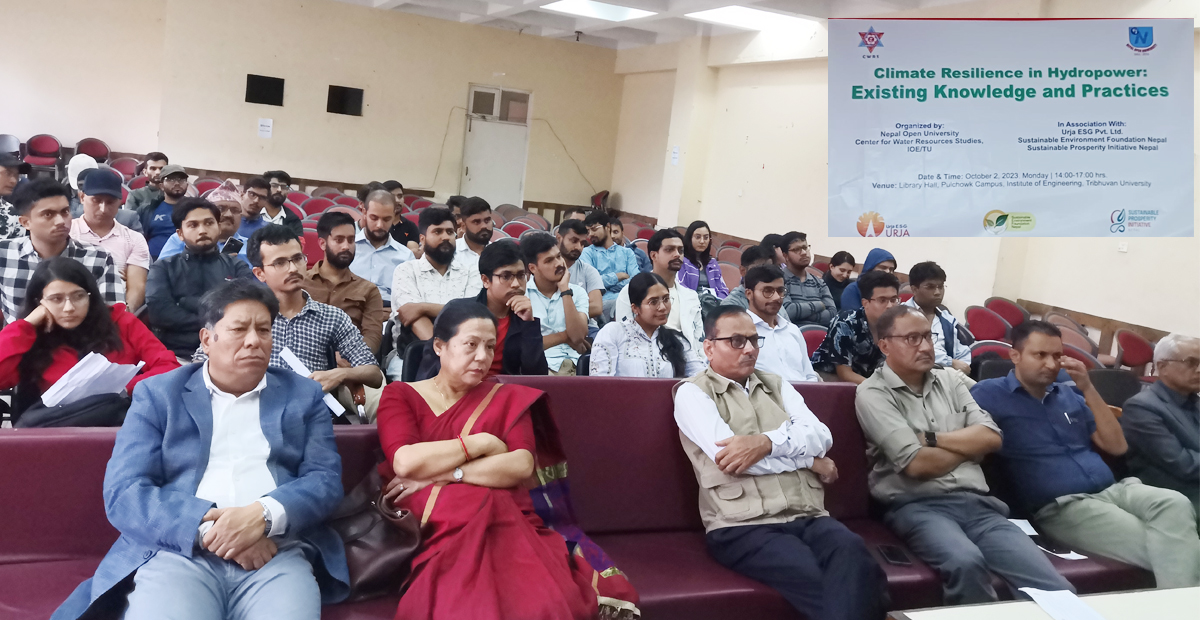
Kathmandu: While there is a growing concern for the possible impacts of climate change on Nepal’s hydropower projects, experts in the field of climate and environment have said that there is not much to worry about with the issue.
The experts have comforted the promoters by stating that the river water fed hydropower plants can utilize the alternative water source even when the mountain snow is fast melting with the climate change.

Speaking at an interaction program on 'Climate Resilience in Hydro Power: Existing and Practices' organized at Pulchok Engineering Campus on Monday, experts said that water resources should be managed properly while minimizing the adverse effects of climate change. According to them, in Nepal, the area in the elevation of up to 3,000 meters receives more rainfall on an average, which can help preserve underground water source, which therefore has to be protected to ensure persisting water source for the hydropower plants.
Diwas Basnyat, coordinator of Water Resources and Climate Program under Nepal Development Research Institute (NDRI), said various studies have shown that water sources generated from underground reserves are more meaningful compared to those from melting snow. “In this regard, more emphasis should be given to preserve the underground water base in order to take forward hydropower projects smoothly.”

Basnyat said hydropower projects built in small scale and short-distance watershed areas are being more affected by climate change. For this reason, according to him, projects smaller than 10 megawatts capacity could not meet the annual energy quota, while they are obliged to pay a cash fine to the Nepal Electricity Authority. 'As the problem seems to be more severe in coming days, stakeholders concerned should pay proper attention to protect watershed areas to tackle this problem.'
Professor of Pulchok Engineering Campus Bishnu Prasad Pandey said that the impact of climate change will be seen in every area. However, the hydropower production will increase even with melting of snow due to climate change in winter.
'Such activities can cause many problems such as increasing the problem of sediment in the reservoir thereby affecting the cooling system of the power plant,' Pandey said, 'If we can reduce the emission of greenhouse gases, climate change can be minimized.'
Similarly, the Chairman of Nepal Energy Foundation, Mohan Das Manandhar, said in the electricity bill that is under purview of parliament, a provision should be maintained to build hydrological and meteorological stations in the rivers that generate electricity for projects above 25 megawatts. "If such a provision can be made, the damage that may be caused to hydropower projects due to climate change in Nepal can be minimized," he said.
On the other hand, Mithun Paudel, an executive member of Independent Power Producers’ Association of Nepal (IPPAN), said there is a problem with the rule that Nepali hydropower projects must submit a projection on how much water will flow in the river. "If they do not do so, they will have to pay fines, while if their projection is wrong also, they will have to pay fines. This has caused problems for private energy producers," he added.
Paudel stressed on the need for a collaboration of the private sector and the government to reduce the effects of climate change.
Dr Ganesh Neupane, general manager of Energy Developers Pvt Ltd, who also coordinated the program, said that the private sector should also pay enough attention to minimize the effects of climate change. He said, 'Even the promoters who invested billions of rupees to develop the hydropower project have not paid attention to the construction of a hydrological station as a part of their project. Now, it is necessary to work towards this step by step.'